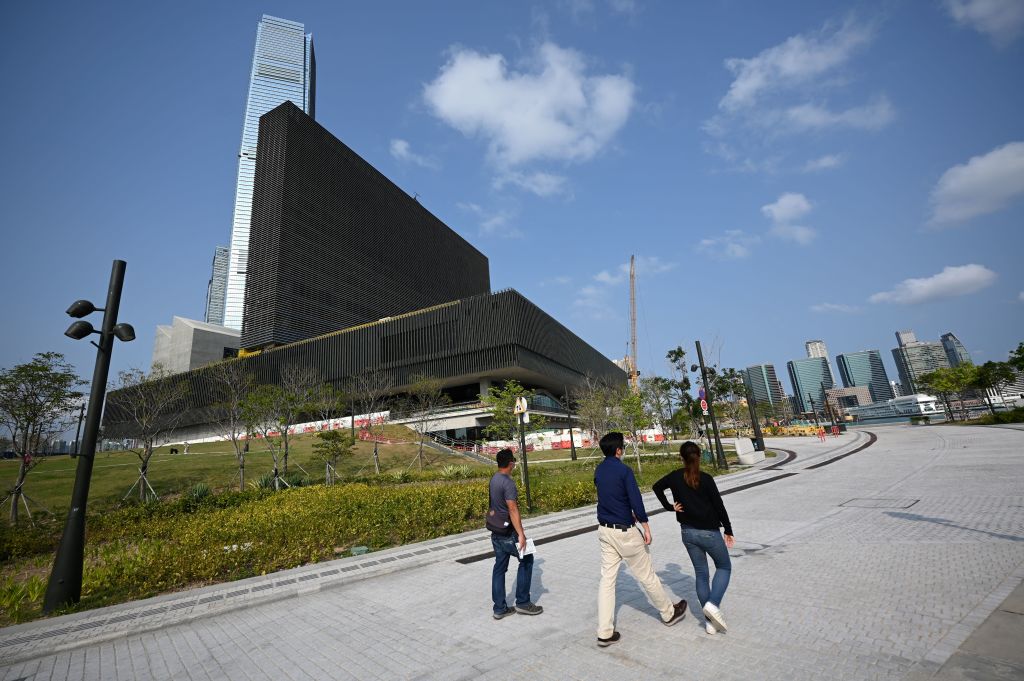
Hong Kong’s long awaited M+ Museum has announced an opening date. When the institution dedicated to modern and contemporary visual culture finally opens its doors on November 12, it will be against a very different political backdrop than its leaders anticipated when M+ was first conceived more than a decade ago.
This shift is already evident on the museum’s newly launched website, where an image of Ai Weiwei’s photograph of Tiananmen Square has been removed while it awaits review by the authorities, Artnet News has learned.
Earlier this spring, pro-Beijing politicians had accused Ai’s Study of Perspective: Tian’anmen (1997)—which depicts the Chinese dissident artist raising a middle finger at Beijing’s Tiananmen Square—of “spreading hatred against China” under the country’s national security law, which went into effect in Hong Kong last June.
Another work by Ai, Map of China (2003), has also been censored online. That sculpture, a 3D map of the country made of wood salvaged from demolished Qing Dynasty temples, aims to celebrate China’s cultural and ethnic diversity. The sculpture and photograph are part of the M+ Sigg Collection, a major Chinese art trove donated to the museum by Swiss entrepreneur Uli Sigg.
Both images could be seen on the beta version of the M+ collection website, but were no longer available when the final site went live on August 10.
“M+ is reviewing the treatment of certain images of works having regard to the advice obtained from relevant authorities including the Office for Film, Newspaper and Article Administration,” a spokesperson for the museum told Artnet News. “The images concerned are not uploaded pending completion of the review.”
A screenshot of M+’s website, with images of some Ai Weiwei works missing.
Many images of works by Ai are accessible on the website, including Still Life, an installation comprising thousands of axes from the Stone Age that was exhibited when the M+ Sigg Collection was first unveiled in Hong Kong in 2016, as well as other pieces from the “Study of Perspective” series, including Bundeshaus Bern (1999) and White House (1995).
Ai questioned the inconsistent treatment of the series. “Why is M+ not showing Tian’anmen but keeping White House?” the artist told Artnet News. (Ai recently wrote an op ed for Artnet News about M+’s decision not to show the work in its opening show.)
Hong Kong’s Office for Film, Newspaper and Article Administration is responsible for “enforcing the film classification system under the Film Censorship Ordinance,” “controlling the publication of obscene and indecent articles,” and the registration of local newspapers. The government proposed in August to amend the Film Censorship Ordinance, giving the chief secretary, the city’s number two executive, power to revoke any approval given to a film should its exhibition “be contrary to the interests of national security.”
Ai Weiwei, Study of Perspective: Tian’anmen (1997). M+ Sigg Collection, Hong Kong. By donation, © Ai Weiwei.
In addition to the two works by Ai, a number of other objects in the M+ collection are not shown on the website, including some of those by Kacey Wong, who is known for his political art and recently left Hong Kong for Taiwan in “self-imposed exile.” However, some works that might be considered politically sensitive, such as Liu Heung-Shing’s photographic series “China After Mao” and images depicting the summer of 1989 in Beijing following the Tiananmen crackdown, are accessible.
The soon-to-open museum stated that digitization of its 8,000-object-strong collection “is an ongoing effort” and that the collection “will be updated periodically as new works, information and intellectual property rights become available.”
The museum’s inaugural exhibitions will likely be closely watched by Chinese authorities for evidence of its compliance with the rules—and by the international art community to gauge its willingness to confront sensitive subjects. The museum announced on Wednesday that its debut presentations will feature around 1,500 works spanning fine art, film, design, architecture, and archival items.
The six thematic exhibitions will include a section dedicated to the evolution of Hong Kong’s visual culture from the 1960s to the present; a special presentation of the M+ Sigg Collection titled “From Revolution to Globalization”; and a chronological survey of Chinese art from the 1970s to the 2000s.
M+ will also present Asian Fields, a monumental installation that comprises tens of thousands of clay figurines by the British artist Antony Gormley, who created the work with more than 300 villagers from Guangdong in the span of five days in 2003.
“Compared to leading modern art museums in the West, M+ will look very different, because our vantage point on this side of the world is distinct,” Doryun Chong, deputy director of the museum, said in a statement announcing the inaugural program. “This is a multidisciplinary contemporary collection, grounded in Asia and like no other in the world.”